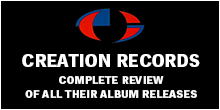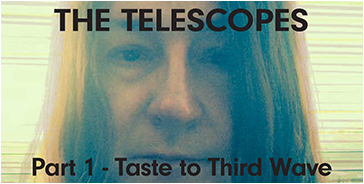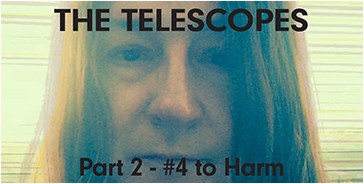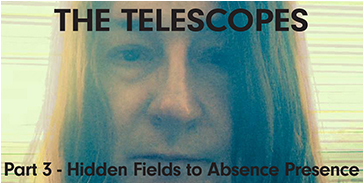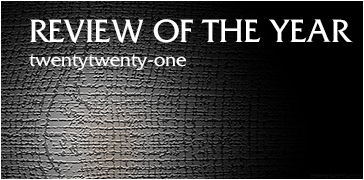


The world may have gone to hell, but The Telescopes were never concerned with what lay before their eyes, only with what lay beyond that. Nearly thirty-five years on, their focus has never wavered. Always searching, never content to stand still, Stephen Lawrie is one of the most remarkable artists of the alternative era. What is to come is a mystery, but what has been before can always be reassessed under new light. Stephen discusses his albums with Isolation, with Part One looking at his work from Taste to Third Wave.
We live in a world where everything has splintered and everything exists at once. It used to be that fashion would follow fashion and that musical movements would rise and fall. No more. The internet has made everything exploitable. People have been broken down into component parts with corporations able to target every facet of your being. This leaves no room for fashions or mass movements; these have been replaced by trends, chained to a hashtag, that endure a matter of minutes before dropping off a list into oblivion. Time is money. Why waste time on one fashion when you can sell every fashion at once? Everything can be used to turn a buck, everything is on the roster. Inevitably, then, every band that ever existed has reformed; even those that disappeared because they were redundant and irrelevent can be sold to somebody, somewhere. The internet is now the universal Butlins where the ghosts of the past tap the boards; a shabby kaleidoscope that doesn’t create fascinating patterns of light, but dislocated vistas of sorry shades.
Now everything has become product, it is heart-warming when you come across bands who have resolutely remained aloof from all of this. These bands never fitted into a pattern and could never be tied down. They exist in their own sphere and appear to be impervious to manipulation and change. The Telescopes are one such band. It’s nearly thirty-five years now since they first came into existence and still they survive, ploughing their own furrow and going exactly where they want to go without the slightest nod to expectation or commerciality. Just take a look at the band’s Wikipedia page where they are branded as a space rock, dream pop, psychedelic, shoegaze and noise pop band. Everyone wants to drop a label, but the Telescopes are having none of this. They are band that can't be labelled. Their creator, Stephen Lawrie, is an experimental artist who goes where the music takes him. And never sits still.
The Telescopes were formed in Burton-upon-Trent in 1987 when vocalist and guitarist Lawrie grew tired of being a part of bands in which he never felt completely comfortable. Being a fan of the likes of Suicide, The Stooges, The 13th Floor Elevators, Einsturzende Neubaten, Lydia Lunch, Sonic Youth, Faust and Can, his tastes were a little more esoteric than the mainstream alternative and as nobody was creating the music he liked, it made sense to write it himself. Over a period of time he built up a band that was attuned to his way of thinking and capable of capturing the sound he was looking for. This was a slow process and The Telescopes went through numerous changes before the classic line-up (Lawrie, Jo Doran - vocals/guitar, David Fitzgerald - lead guitar, Robert Brookes - bass, Dominic Dillon - drums) came together, a move that Lawrie once described as a "natural gravitation" rather than a search and find mission.
It was the perfect line-up of the band to create waves on the live circuit, and it really did take a lot to get noticed in those days as the alternative scene was crowded with remarkable live acts. But these Telescopes quickly proved they would be very difficult to ignore: Fitzgerald and Doran raged in the wings, the rhythm section powered on relentlessly, and front man Lawrie mesmerised in centre stage. It wasn’t about connecting with the audience; they seemed inconsequential to the main task which was to lay down brutal, yet sculptured, layers of sound that were the answers to all of their own questions. It was always about the music; it was the only thing that made sense.
It was thanks to their prowess as live performers that The Telescopes came both to record their music and to be able to have it released. It was at a gig in Birmingham that Paul May and Nick Allport of Sowing Seeds fanzine first caught them live and were surprised by what they saw, having expected from the band’s name that the music would be twee. At the time Sowing Seeds, based in South Woodford in London, had built up a substantial circulation, focussing on the harder end of the UK alternative scene, and was considered to be both important and influential. But that no longer appeared to be enough and the duo began to think about moving on from the fanzine into taking a more hands-on approach to the music they loved. Perhaps they needed to form a label. Ideas were germinating.
Shortly after this The Telescopes played at a venue called In-Psychclopedia in Lincoln where they were approached by Mike Stout who lived in Leeds with a record producer called Richard Formby. They encouraged the band into the studio where they recorded two tracks, 'Kick The Wall' and 'This Is The Last Of What’s Coming Now'.
We had no label when we went into the studio with them. We recorded the two tracks on the condition that if we found a label to release it we would ask them to cover the studio time. Richard and Mike knew someone would pick it up. Then Nick and Paul got in touch to ask for a Telescopes’ track to go on a split flexi with Loop. I think we were actually working on ‘Forever Close Your Eyes’ at the time and we had to edit the track down to fit on the flexi, so a couple of verses were binned. They then scrapped the ’zine in order to form Cheree Records to put out our records and others by Bark Psychosis and Whipping Boy. They released some fantastic stuff.
It was fitting that The Telescopes’ first recorded work was shared with Loop. Unlike today, there was no major psych scene at the time and only a handful of bands in the alternative field, such as Loop and Spaceman 3, were revealing such influences. Of the three, The Telescopes hit hardest with their garage-psych maelstroms and Cheree’s first solid vinyl release in January 1989 was 'Kick The Wall', which blew most everything else around out of the water. The original 500 copies of the seven-inch sold out rapidly and the label were forced to press 500 more. The song has such a hold on Lawrie that it is used as the band’s Twitter tag to this day.
Three months later The Telescopes underscored their potential with the blistering '7th # Disaster' the fourth release by Cheree, which saw light of day in a run of 3,000 twelve-inch singles.
It was at this time that Cheree discovered American label What Goes On and introduced them to the band. The label was known for releasing music by garage acts from Australia, America and Sweden and already had thirty albums under their belt from the likes of The Celibate Rifles, Yo La Tengo, Soul Asylum and Died Pretty before they agreed to work with The Telescopes. The first product of this new partnership was released on 18th September 1989, with 'The Perfect Needle' single immediately being embraced as a classic and for many people it remains the highlight of The Telescopes' recorded output.
Not unusually for the times, the music press were a step behind when confronted by its uncompromising sound. According to Stuart Maconie in the NME, "No matter what speed we played this at it always sounded like the wrong speed." Miles Hunt of The Wonder Stuff who was commenting on the week’s releases added, "This is complete rubbish; even the band must know it’s rubbish," with Martin Gilks commenting, "This is bloody awful. No tune, no sense. Just a dirge, a drone." The irony of that last comment was unintentional. Indeed, irony didn't appear to be The Wonder Stuff’s strong point as they released, 'Don't Let Me Down Gently' at exactly the same time.
Despite an almost total lack of record label promotion, 'The Perfect Needle' went straight into the upper reaches of the Independent Singles Chart, remaining there for some weeks and reaching the heights of number five. This was eclipsed when The Telescopes' debut album Taste was released by What Goes On on 16th October 1989 and smashed into the charts at number two.

Taste was like no other record of its day, a melting pot of influences weaponised and hurled at the world. Not with abandon, for the songs are carefully constructed and refined to have the maximum impact; Lawrie and producer Richard Formby shape sound not just to inflict damage but to create astonishing textures that can take your breath away with their abrasive beauty. Of course you cannot pin down one sound. There are many bands that leap to mind as you listen to the record and numerous genres. Lawrie screams, mumbles and even sings, while Fitzgerald and Doran create sculpted havoc. Brookes and Dillan take everything in their stride. Amongst the darkness – and Taste is certainly a dark record – small touches add flickers of light: Julian Overton’s violin lifts 'The Perfect Needle' to another plane, while strings and horns grace '...And Let Me Drift Away'. Few alternative bands would have employed such instruments on a debut album, but Lawrie’s confidence is evident. If a song needs wah-wah guitar it is there in spades, but if it requires a more delicate touch, this is not overlooked.
During the recording sessions Lawrie took the opportunity to experiment in the studio and to use it as another instrument, just as PiL had done in their early days. Tape loops were added, bass was recorded through a desktop fan, equipment was mistreated. All for effect. Lawrie lays down sound on a tape just as an artist lays down paint on a canvas. At their heart The Telescopes are and remain experimental, looking to create the moods and sounds that fit in with the times.
What fitted with those times was explosive, and sometimes the fury they captured is beautiful in itself. In the churning monster of 'Violence' Lawrie’s stream of conciousness lyrics build unfinished poems while the guitars play with a rattle of death amid a welter of crushing noise. It’s simply glorious. But enough is enough and the song is ruthlessly cut off in its prime. There are times when The Telescopes transcend all expectations.
Since its first release, Taste has been reissued on Cheree, Rev-ola, Bomp! and Fuzz Club. None of these releases feature the lyrics which appear only to have been included on the first pressing of the original What Goes On album. It’s a shame they weren’t included on the beautifully presented 30th Anniversary pressing released by Fuzz Club in 2019, available here.
It’s never easy to catch all the words Lawrie sings without having the lyrics to hand, but some of his couplets on Taste are sublime, "I’m nothing more than less can be / You’re one below me." Brilliant.
In top form, The Telescopes released another blistering single, 'To Kill A Slow Girl Walking' in January 1980 before a live album appeared without any input from the band.

Just as the band were beginning to get noticed on a wider stage, things came to a grinding halt when What Goes On went bust, leaving the band in limbo.
The whole Precious Little EP was already recorded when WGO went into receivership. Two days before, their CO Seth Rudman had us over to his place for breakfast promising the world. He must have known what was about to happen. Cheree secured lots of meetings with various labels but the story was always the same, we're up for working with The Telescopes once you're out of receivership. None of them had the balls to take it on until we met Alan McGee through Primal Scream. He wasn't phased at all, he returned my back catalogue to me and put out Precious LIttle.
Under McGee’s guidance, The Telescopes entered the most successful period of their career. The Creation Records founder saw something he liked in the band and worked closely with them to develop their sound and build their following.
Alan was heavily involved. Shortly after signing he took over the management of The Telescopes as well as the label side of things. Yes, he encouraged the more commercial side; whether or not it charted he knew The Telescopes were making music that people would be listening to for a long time to come. Alan liked to share his love for things. He did push for more commerciality but his main influence was mostly the passion he shared.
It was a fruitful period for Lawrie and the band as they released four excellent EPs on Creation over 1990 and 1991: Precious Little, Everso, Celeste and Flying. Unfortunately, McGee became ill and was forced to step away from the label’s activities soon after the band had recorded their second album. It left The Telescopes in limbo.
The Telescopes were very much an Alan project, once he got ill and took time out no one else at the label really knew what to do with us. In hindsight it was time for me to take time out too.

The pop-groove aesthetic that had become embedded in Creation didn’t fail to intrude into these recordings, but only in a minor way. You can hear it in 'Flying', the band’s last single for the label, where the shuffling beat and soaring essence-of-the-sixties guitars dominate. Yet Untitled largely exists on its own terms. It is much more rooted in sixties psychedelia than its predecessor, featuring sitars along with cello and piano. Softer sounds dominate with Lawrie, who mainly plays acoustic guitar, occasionally showing a nice pop sensibility especially on 'Ocean Drive' which could have been written by The Boo Radleys. In 'You Set My Soul' the music branches into lounge jazz while the gentle jazz-psych of 'Yeah' shows that if Untitled is not necessarily a more personal album than its predecessor, it is less protective and emotionally more capable. This is underlined in 'Spaceships' where Lawrie states, "Some kind of happiness is all we need to make ourselves worthwhile," a concession he would have struggled to make on the band’s debut. Yet nearly three years had passed since that record and The Telescopes were never a band to remain in the same place for any prolonged period of time. There is a searching for new ways epitomised by 'And', a foggy waltz with buried vocals that certainly lays the foundations for some of Lawrie’s future work.
Though Untitled represented a step into unknown territory for The Telescopes, there is no tenativeness; the album is remarkable for its complete lack of fear with Lawrie able to explore intimacy without making himself appear vulnerable. There is an assurity there that allows every word to come across as a statement of truth.
There’s little doubt that the sound of Untitled came as a shock to the band’s following and again much of the music press were unprepared for progress and change. Lawrie doesn’t see the record as an abrupt change of style, pointing to the progression in the band’s sound that was traceable over the four Creation EPs and his determination not to keep making the same record over and over again.
With Alan McGee's illness it seemed like an appropriate time for a break. The Telescopes departed from Creation and were not to release another album for ten years. Inevitably the band members moved on to new things, but this was not something Lawrie mourned; he has always regarded the band not as something set in stone, but as a vehicle for his art.
Everybody who has played in The Telescopes has brought something to the table in some way, be it practical, creative or both. The group dynamic has never been something that worked for me creatively really, I don't believe in democracy in music, I think you need someone with a clear idea to navigate ahead. I think The Beatles maybe came close to a democracy, but then three of them were consistent writers who steered their own songs. When you break it down it's four people playing on each other’s records really.
It’s always a new way of working, Third Wave had a lot of musicians on there, more than the second album, and I sourced the cellist, violinist and vibraphone player through the Musician’s Union. I was exploring ideas very similar to Third Wave when The Telescopes and Creation parted ways. After that I spent time learning about the kind of technologies used on Third Wave and I set up the Antenna label.

Third Wave was a new beginning with its cover featuring a child's drawing hinting that everything had gone back to basics. With the band’s past largely a memory due to the long hiatus, Lawrie had a blank canvas on which to work and made good use of his studio knowledge as well as delving into the new technology he had spent the past few years exploring. There are hints of Untitled here, occasional echoes of jazz, and more of the experimentalism seen in 'And' where the vocals largely disappear under waves of largely ambient and vaguely connected patterns of sound. Third Wave is full of the repetitive phrases that are a major part of the pysch world, creating a hypnotic, even drugged sound, that never pulls itself out of its self-induced trance.
Again, there are moments that astonish. Opener 'A Cabin In The Sky' has a melodic sway that is reminiscent of The Beatles, with the childish giggling again hinting at new birth. That pop sensibility remains on the gently plunging 'When Nemo Sank The Nautillus' where the dual vocals with the last remaining Telescope, Jo Doran, drift past gracefully. There's a clever use of instrumentation throughout which serves to pull the music in different directions at the same time; it wouldn’t have been out of place if some of Lawrie's music had featured in David Lynch's television masterpiece, Twin Peaks.
The cover art was more to do with simplicity and the complexity of simplicity. Sometimes you can say a lot more with a couple of brushstrokes or lines than you can with intricacy. A lot of my arrangements are very simplistic, it's when you put them together they become something else. I guess in some ways it's like going back to square one with every Telescopes album, there’s no formula in place or any template to work to, each song finds its own way into the world. It makes more work for myself but it feels like the right thing to do in order to stay focussed.



